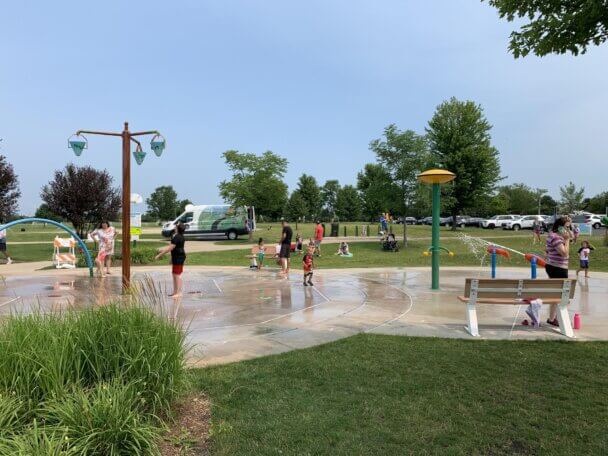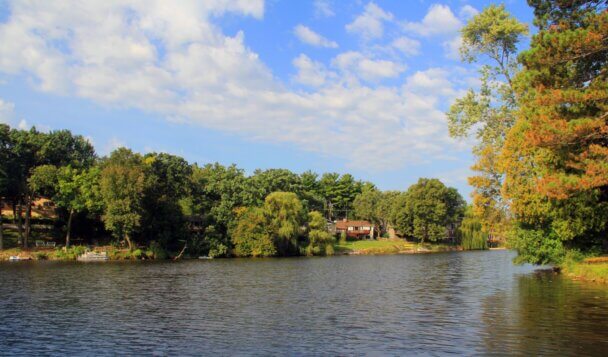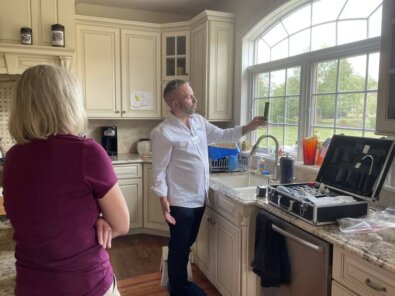Struggling with hard water in Lake in the Hills, IL? Angel Water understands the specific water challenges faced by residents here. Our high-quality water softening systems are designed to eliminate excess calcium and magnesium, providing soft, clean water for your home or business. With over 50 years of experience in the water treatment industry, we are dedicated to enhancing your water quality and ensuring your complete satisfaction. So, if you need water filtration equipment and supplies or the services that go with them, please don’t hesitate to stop in or reach out.
Water Softener Companies
in Lake in the Hills, IL

Quick Start Guide for Solving Lake in the Hills Water Issues
- Reach Out – Call or submit a form to learn more and schedule an appointment.
- Water Testing – We’ll come to your home to test your water to understand your water problems.
- Discuss Our Findings – Learn what’s lurking in your family’s water and have your questions answered.
- Recommend Solutions – Our water expert will recommend equipment to remedy your home’s unique issues.
- Execute Your Clean Water Plan – We’ll install and maintain the water quality equipment needed to address your water issues.

Local Water Problems in Lake in the Hills, IL
Lake in the Hills offers plenty of indoor and outdoor activities for the whole family. You can take a relaxing hike or let the kids play at Barbara Key Park or Nature’s View Park. If you’re looking for something a little less active, you can catch a movie at the local AMC or grab a pizza at Moretti’s.
Unfortunately, Lake in the Hills is also home to some local water problems…
Here’s What You Need to Know About the Drinking Water in Lake in the Hills, IL
Do you know what’s in the drinking water in Lake in the Hills? We have put together this guide to help you stay informed!
Even though the Environmental Protection Agency (EPA) tests Lake in the Hills’ water regularly, they often do not set legal limits for contamination. The Environmental Working Group (EWG), on the other hand, sets much stricter health guidelines. Therefore, we suggest looking at the EWG guidelines when determining how to protect your health.
In a recent assessment, the Environmental Working Group (EWG) found that Lake in the Hills has multiple contaminants that exceed acceptable limits. The known contaminants include:
- Arsenic
- Haloacetic Acids
- Radium (-226 and -228)
- Total Trihalomethanes
Below we will take a closer look at each of these contaminants and how Angel Water can help you defend against them.
| Contaminant | 2017 Total |
EWG Recommendation
|
| Arsenic | 0.288 PPB | 0.004 PPB |
| Haloacetic Acids | 16 PPB | 0.1 PPB |
| Dibromoacetic Acid | 0.593 PPB | 0.04 PPB |
| Dichloroacetic Acid | 6.17 PPB | 0.2 PPB |
| Trichloroacetic Acid | 6.17 PPB | 0.2 PPB |
| Radium-226 and -228 | 0.63 PCI/L | 0.05 PPB |
| Total Trihalomethanes | 29.3 PPB | 15 PPB |
| Bromodichloromethane | 7.35 PPB | 0.4 PPB |
| Chloroform | 18.9 PPM | 0.4 PPM |
| Dibromochloromethane | 2.92 PPB | 0.1 PCI/L |
Arsenic
Arsenic is a naturally occurring mineral that is found in the drinking water of all 50 states. Contamination can come from natural, industrial or agricultural sources.
The EPA and World Health Organization classified arsenic as a “known human carcinogen.” It presents serious health risks, including:
- Bladder cancer
- Lung cancer
- Skin cancer
- Liver cancer
- Kidney cancer
- Prostate cancer
- Kidney damage
- Cardiovascular disease
The EPA currently sets a legal level of arsenic in drinking water at 10 ppb (parts-per-billion). However, the EWG believes that is limit too high. Their guideline sets acceptable levels at 0.004 ppb. In the report released by the EWG, Lake in the Hills had levels of arsenic at 0.288 ppb, or 72x higher than the EWG guideline.
Haloacetic Acids
The haloacetic acids are a group of five acids, including monochloroacetic acid, dichloroacetic acid, trichloroacetic acid, monobromoacetic acid and dibromoacetic acid.
These acids form when disinfectants, like chlorine, are added to drinking water. The health problems associated with consuming these acids include a higher risk of cancer and problems to fetal growth during pregnancy.
The EPA sets a limit for all haloacetic acids to be at 60 ppb. However, the EWG sets their acceptable standard at 0.1 ppb. A recent test showed the levels at 16 ppb, or 160x the EWG limit.
Three of the haloacetic acids also exceeded the EWG limits:
- Dibromoacetic Acid – 0.593 ppb (15x higher than the EWG standard)
- Dichloroacetic Acid – 6.17 ppb (31x higher than the EWG guideline)
- Trichloroacetic Acid – 9.23 ppb (92x higher than the EWG health guideline)
Radium-226 and -228
Radium is a radioactive element that infiltrates water from natural sources as well as oil and gas extraction activities. If there is enough radium in the water, it can lead to bone cancer, kidney damage, congenital defects.
Both the EPA and the EWG test for two types of radium, radium-226 and radium-228, and combine the results in their reports. The EPA sets the legal limit for radium at 5 picocuries per liter (pCi/L), while the EWG sets a lower limit of 0.05 pCi/L.
As of 2017, the levels of radium-226 and radium-228 in Lake in the Hills’ water tested at 0.63 pCi/L, or 13x higher than the EWG health guideline.
Total Trihalomethanes (TTHMs)
Trihalomethanes are contaminants that, like haloacetic acids, form during water treatment with chlorine and other disinfectants. They are a grouping of four chemicals:
- Chloroform
- Bromodichloromethane
- Dibromochloromethane
- Bromoform
These disinfectant byproducts can increase the risk of bladder cancer and liver, kidney and intestinal tumors. They can also lead to problems during pregnancy, including spontaneous miscarriage, cardiovascular defects, neural tube defects and low birth weight.
The EPA sets the legal limit for these contaminants at 80 ppb, while the EWG sets it at 15 ppb. A recent test showed a total of 29.3 ppb, which is 195x higher than the EWG health guideline.
Three out of the four trihalomethanes tested also exceeded EWG guidelines. The only one that did not was bromoform. Here are the totals for the other three:
- Bromodichloromethane – 7.35 ppb (123x higher than the EWG guideline)
- Chloroform – 18.9 ppb (47x higher than the EWG guideline)
- Dibromochloromethane – 82 ppb (28x higher than the EWG guideline)
Water Softener Installation in Lake in the Hills, IL
Angel Water does more than sell water softeners—we also specialize in expertly installing them for our Lake in the Hills clients. Our licensed plumbers prioritize your family’s safety by strictly following Illinois plumbing regulations. Our meticulous approach is crucial because improper plumbing work can introduce harmful bacteria, viruses and other contaminants into your home’s drinking water. Once there, it can make your family ill, so we don’t take chances – and neither should you!
Water Softeners in Lake in the Hills, IL
Water softeners come in many sizes, makes and models (some with advanced features) to suit the unique needs of every Lake in the Hills home. Regardless of whether you have city or well water, Angel Water offers an option to meet your home’s water-softening requirements. We highly recommend the PurASoft ERRC3702 to our Lake in the Hills customers because of its exceptional reliability and performance.
Reverse Osmosis Systems in Lake in the Hills, IL
Our Lake in the Hills reverse osmosis systems are designed to protect your home’s drinking water from harmful toxins like cyanide, lead, mercury and hexavalent chromium. Advanced RO systems usually include carbon filters to improve the smell and taste of tap water, which can encourage greater consumption and hydration. In turn, this may lead to better health outcomes.
Chlorine Injection in Lake in the Hills, IL
A chlorine injection system addresses common tap water problems like bad smells and sour tastes. The system eliminates bacteria and oxidizes toxins to ensure your well water smells and tastes better. Plus, a chlorinator will protect your home’s plumbing and support your family’s health by maintaining a high quality of water.
Whole House Filters in Lake in the Hills, IL
Lake in the Hills whole house filters are a more comprehensive solution that purifies every drop of water in your home from every faucet. The benefit of purifying all your home’s water goes beyond improving water quality for drinking. It also addresses common household issues like chlorine odors, metallic tastes and stained or faded clothing.
Sump Pumps and Battery Backups in Lake in the Hills, IL
We provide sump pumps and battery backups to protect the basement in your Lake in the Hills home from flooding and consequential water damage. Basement water damage can lead to serious issues with your health and home, like breathing difficulties, severe allergic reactions, mold growth and foundation cracks. Angel Water is dedicated to safeguarding your family and property with these dependable protective solutions.
Water Heaters in Lake in the Hills, IL
If you’re experiencing cold showers, energy bill spikes or low water pressure without an obvious cause, your water heater may be faulty. Thankfully, Angel Water provides various electric and gas water heaters from top brands to suit families and homes of all sizes and water usage.
Alkaline Water in Lake in the Hills, IL
Many Lake in the Hills residents believe maintaining the body’s pH balance is crucial for overall health because an overly acidic blood pH can lead to various health issues. Angel Water offers an Alkaline/Remineralizing System as a solution that can easily be integrated as an upgrade to your existing reverse osmosis system.
Water Softener Maintenance in Lake in the Hills, IL
Regular water softener maintenance is vital for ensuring the ongoing protection of your home and family. If you haven’t scheduled annual maintenance yet, you don’t want to wait! Annual service visits will also include addressing common issues like leaks, proper salt usage and low water pressure. Staying proactive with maintenance ensures your water softener continues to work properly and prolongs your system’s usable lifespan to increase your ROI.
Water Testing in Lake in the Hills, IL
Do you know what toxins or contaminants are present in your home’s water? The only way to know for certain is to have comprehensive water testing done from your home’s faucet. City water reports are often done at the street level and don’t accurately account for any contamination that occurs between the street and your faucet. If your home relies on well water, there are no regulatory bodies testing it, and the onus is on you to do so.
Plumbing Services in Lake in the Hills, IL
It’s the law in Illinois to use licensed plumbers to install your Lake in the Hills water filtration equipment – and Angel Water takes this very seriously. After all, we prioritize your family’s health above all else and understand the consequences of using improper plumbing practices.
Why Choose Angel Water?
Expertise:
Over 50 years of experience in resolving water quality issues.
Advanced Technology:
Our water softeners use the latest technology for efficient operation.
Customer Satisfaction:
Free water analysis and customized solutions tailored to your needs.
Qualified Professionals:
IDPH Licensed Plumbers in Illinois ensure high-quality service and regulatory compliance.
Highly Rated:
Over 1,000 5-star ratings on Google demonstrate our commitment to excellent service.
Licensed Plumbing Company:
The only water softening company in Illinois that is also a licensed plumbing company.
Lifetime Warranty:
The only company offering a lifetime warranty on our ERR-3700 series filters.
A+ BBB Rating:
An A+ rating with the Better Business Bureau shows our commitment to quality service.
Learn More About Water Quality in Lake in the Hills, IL
Angel Water is dedicated to keeping our customers informed about the latest news and information surrounding local water quality, the equipment that treats it and related topics. If you want to learn more about water, check out our extensive resource library. You’ll find videos, blogs, FAQs and much more on these topics.
Water Softener Companies in Lake in the Hills, IL
Are you looking for top-notch water filtration equipment, water heaters or sump pumps and battery backups? Want to pair the best equipment with unrivaled customer service? Call Angel Water today at (847) 382-7800 or complete the contact form below to get started! We look forward to hearing from you!
Get Started With a FREE Water Test
Just fill out the form below and we will reach out to
schedule the best time for your free water test!

